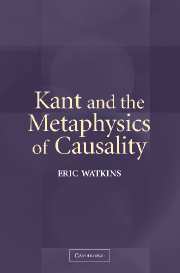Book contents
- Frontmatter
- Contents
- Acknowledgments
- A Note on Citations and Translations
- Introduction
- PART I CAUSALITY IN CONTEXT
- 1 Pre-established Harmony versus Physical Influx
- 2 Kant's Pre-Critical Theory of Causality
- PART II CAUSALITY IN THE CRITICAL PERIOD
- PART III CAUSALITY AND CONSEQUENCES
- Conclusion
- Bibliography
- Index
2 - Kant's Pre-Critical Theory of Causality
Published online by Cambridge University Press: 12 January 2010
- Frontmatter
- Contents
- Acknowledgments
- A Note on Citations and Translations
- Introduction
- PART I CAUSALITY IN CONTEXT
- 1 Pre-established Harmony versus Physical Influx
- 2 Kant's Pre-Critical Theory of Causality
- PART II CAUSALITY IN THE CRITICAL PERIOD
- PART III CAUSALITY AND CONSEQUENCES
- Conclusion
- Bibliography
- Index
Summary
INTRODUCTION
From the late 1740s through the 1770s, debate in Germany about pre-established harmony and physical influx lost much of its political significance, in large part because the intellectual tolerance that came with the inauguration of the “philosopher king,” Frederick the Great, in 1740 considerably improved conditions for free and open public debate, so much so that Wolff could be enticed to return to Halle from his refuge in Marburg. But the issue of causality also attracted somewhat less philosophical attention than it had received earlier in the century, either because physical influx had won the debate or because the sides had become so entrenched that it was clear to many that neither side would budge from its antecedently held views. Thus, most German philosophers during this period were not thinking about causality nearly as much as they had been in the 1720s and 1730s.
However, Kant was a prominent exception to the trend, since he focused on the issue of causality throughout his entire pre-Critical period (1746–1770). For some time after leaving the university, at least from around 1746 to 1758, Kant's intellectual activities were devoted exclusively either to answering scientific questions or to explaining the metaphysical underpinnings of the basic properties of bodies. He published a series of short scientific essays in the mid-1750s, on fire, on the age and rotation of the earth, on earthquakes, and on winds, in addition to his lengthy Allgemeine Naturgeschichte und Theorie des Himmels (Universal Natural History and Theory of the Heavens) of 1755.
- Type
- Chapter
- Information
- Kant and the Metaphysics of Causality , pp. 101 - 180Publisher: Cambridge University PressPrint publication year: 2004

